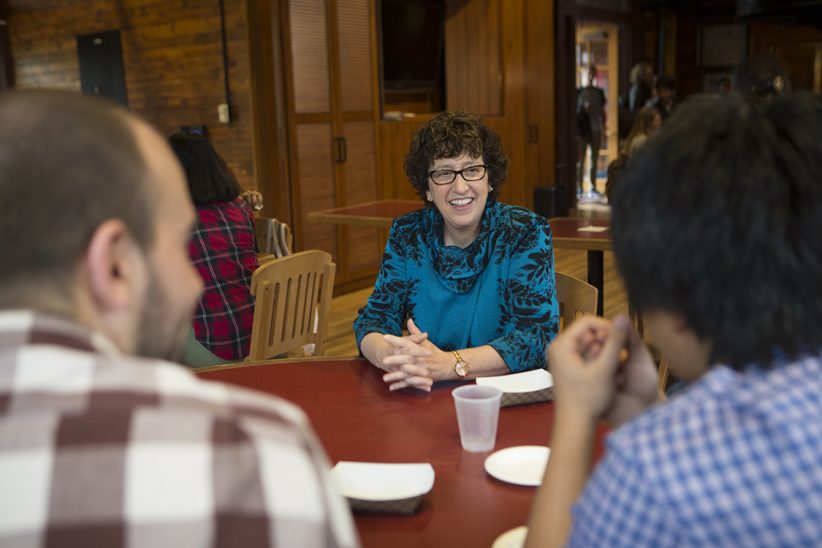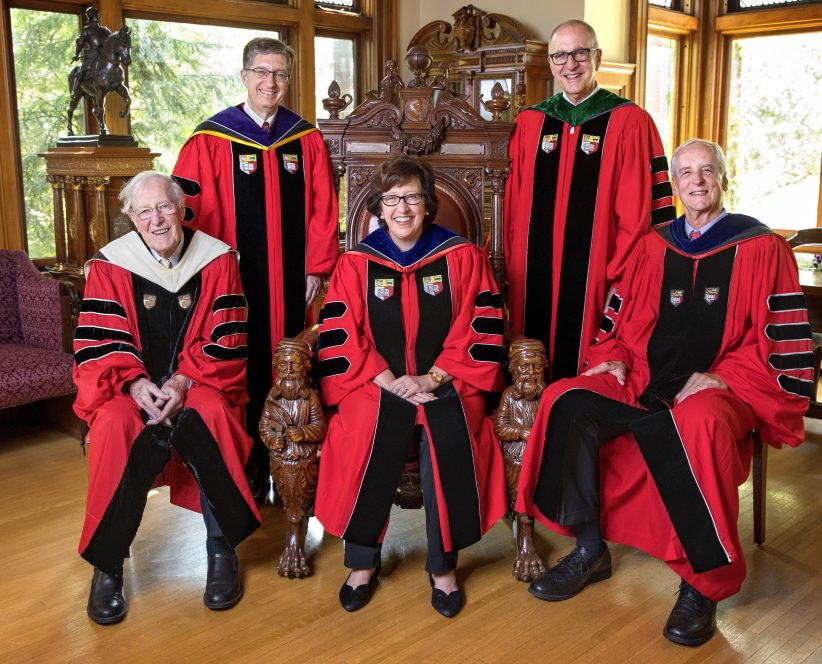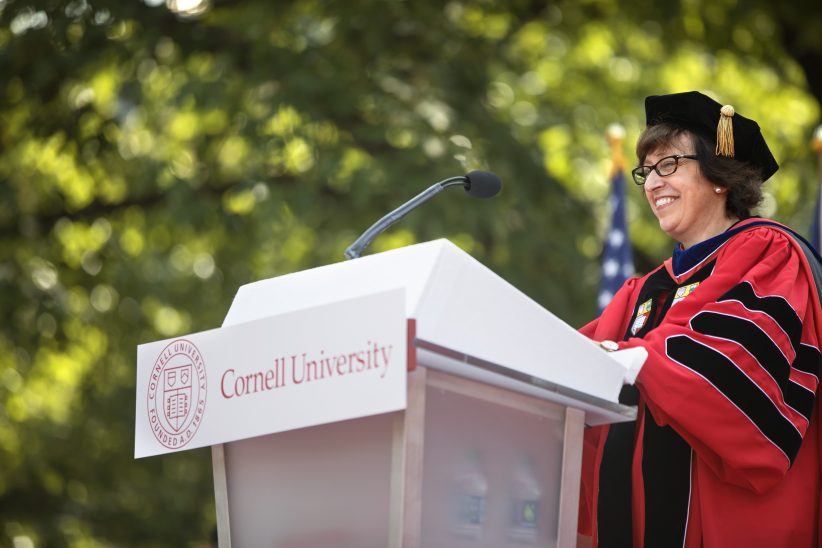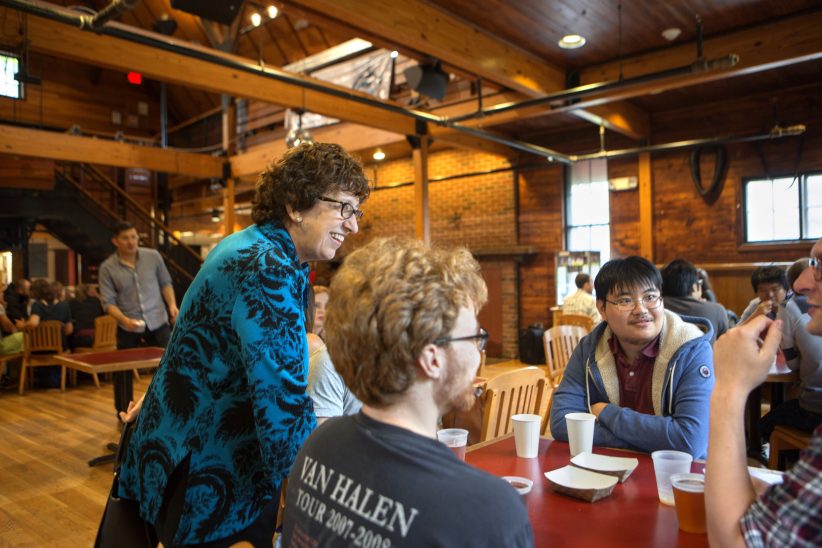President Martha Pollack Q&A
Recently, Cornell’s new president, Martha Pollack, spoke to the Graduate School about her experiences in graduate school, her personal philosophy, and the role she thinks Cornell should play on the national stage. President Pollack began her tenure as Cornell’s 14th president on April 17, 2017. An expert in artificial intelligence, she also holds academic appointments in the Departments of Computer Science, Information Science, and Linguistics.

What motivated you to attend graduate school?
My parents used to tell me that even as a very small child, I always wanted to “play school,” and that, when I did, I always wanted to be the teacher. I’m not sure if it was because I liked using chalk, or because it gave me an opportunity to boss around my younger brother!
Actually, it was not until I was an undergraduate at Dartmouth that I decided I wanted to do graduate work. I’d started college thinking I would study math or a physical science, but after taking an anthropology course, I told the professor I thought perhaps I’d do a dual major. He listened carefully to me, and then suggested that I study linguistics, as it combines the rigor of mathematics with a focus on human behavior.
Since Dartmouth didn’t offer a major in linguistics at that time, he helped me put together my own major, which included as many math courses as a math major, supplemented with courses on language in various departments such as anthropology and linguistics, a semester spent at MIT, and an honors thesis that I wrote on metaphor. I fell in love with research, and so continuing my studies in linguistics at the graduate level seemed a logical choice.
What were your plans for your future when you entered graduate school, and how did your plans change through the course of your graduate studies?
Right out of college, I entered a doctoral program in linguistics, but I left after one semester, for a variety of reasons, some personal and some having to do with the direction of the field of linguistics at that time. I found a job in the insurance industry teaching what was then called “data processing” to employees. It was a wonderful experience: I taught new skills to staff members and thereby opened new job opportunities for them. Computer science was still quite new, and so even with just a few computing courses that I’d taken at Dartmouth, I was able to do this work.

But after a few years, my interest in becoming a researcher resurfaced, and I decided to go back to school. A friend of mine was working on his doctorate in computer science, and he told me about the field of natural-language processing, where I could continue to pursue my interest in language, but from the perspective of computing.
I earned my master’s (1984) and Ph.D. (1986) degrees in the Department of Computer and Information Science at the University of Pennsylvania, completing a dissertation on natural-language discourse. More specifically, I studied plan recognition. The best way to understand what that is is to think about why you don’t usually say “Yes,” if I ask you at the dinner table whether you can reach the salt! The generally accepted explanation is that in interpreting my utterance you have figured out what plan I am trying to carry out with my question—specifically, a plan of having salt for my food. My dissertation involved trying to create computer systems that could recognize someone’s plan.
After graduate school, I shifted from plan recognition to automated plan generation, i.e., enabling computers to develop their own plans to achieve given goals. That, in turn, led to work in the technical subfields of temporal reasoning and constraint satisfaction. Still later, driven by an interest in doing work with more immediate impact, I conducted research on the design and implementation of technology to assist people with cognitive impairment: technology that would help them keep track of and carry out their plans, and technology that could help provide caregivers and therapists with information about how well individuals were managing in their daily activities.
What role do you think Cornell should play on the national stage?
I believe that Cornell can be the model of a relevant, premier university for the 21st century. To do that, we must do three things:

First, conduct world-class research and scholarship that addresses key societal issues, which almost always require a breadth of disciplinary expertise and perspective. Because there are few universities whose breadth approaches ours, we also have the opportunity to probe some of the biggest and most fundamental questions known to humankind for the simple goal of expanding what we know;
Second, provide engaged, evidence-based education that combines rigorous academics with experiential learning, enabling our students to become global leaders with an appetite and ability for lifelong learning;
Third, be a community of diverse faculty, staff, and students that continually develops and models the capacity for communicating and working effectively across different perspectives and experiences.
Do you have a general philosophy that you live by?
Last November, when I accepted Cornell’s invitation to become the university’s 14th president, I talked about some of my core values. At the top of the list is integrity. When making a decision, I always ask not just for all the facts and data, but I also take time to consider what the right thing to do is. I value quality, and thus am proud to be at a university that is academically excellent.
I also value adaptability, and innovation: an openness to change is especially important in a university, because the world is changing rapidly and the universities that survive and thrive will be those willing to adapt and try new things. Being part of a diverse community, with people of different backgrounds and perspectives, is also very important to me.
And finally, I value having fun! If we spend some time together, I’ll certainly tell you a few jokes.
What books are on your bedside table or what were the last three books you read?
It is not easy to pick just three!
Erwin Chemerinsky, dean of the law school at Berkeley, and Howard Gillman, chancellor at UC Irvine, recently wrote an important book, Free Speech on Campus, which I’ve read and also sent to all our the academic leadership team at Cornell as well as to members of the Board of Trustees Executive Committee. Dean Chemerinsky visited Cornell in November; other thought leaders on this issue will be visiting next spring.

Another book on higher education that I’ve found important is one I read a few years ago, called Why Does College Cost so Much? by Robert Archibald and David Feldman. It provides a detailed macroeconomic analysis of the reasons for high college tuition, showing that possibly the key factor is what’s called the cost disease—the fact that over the past century, some segments of the economy, notably agriculture and manufacturing, were able to drive down the cost of production through automation, while others, like law, the arts, medicine, and education, were not.
But I’m also heavily influenced by fiction: I think great fiction teaches you an enormous amount by having you “get into the heads” of other (fictional) people.
Among the books I’ve read lately that I found especially compelling were three finalists for the 2017 Man Booker Prize, including the winner, Lincoln in the Bardo, by George Saunders, a book that teaches a lot of leadership; The Underground Railroad by Colson Whitehead, which teaches a lot about this nation’s past—and our present; and Emily Fridlund’s debut novel, Hidden Lives of Wolves, which teaches about relationships. I should also note that Dr. Fridlund completed a postdoc in English at Cornell and is now with us as a visiting scholar.
About President Pollack:
President Pollack was previously provost and executive vice president for academic affairs at the University of Michigan. As the university’s chief academic officer and chief budget officer, she was responsible for an academic enterprise that serves more than 43,000 students and includes 19 schools and colleges plus freestanding research units, libraries, museums, and gardens.
She graduated summa cum laude with a bachelor’s in linguistics from Dartmouth College, She earned her master’s (1984) and Ph.D. (1986) degrees in the Department of Computer and Information Science at the University of Pennsylvania, writing a doctoral dissertation on natural-language processing by computers.
